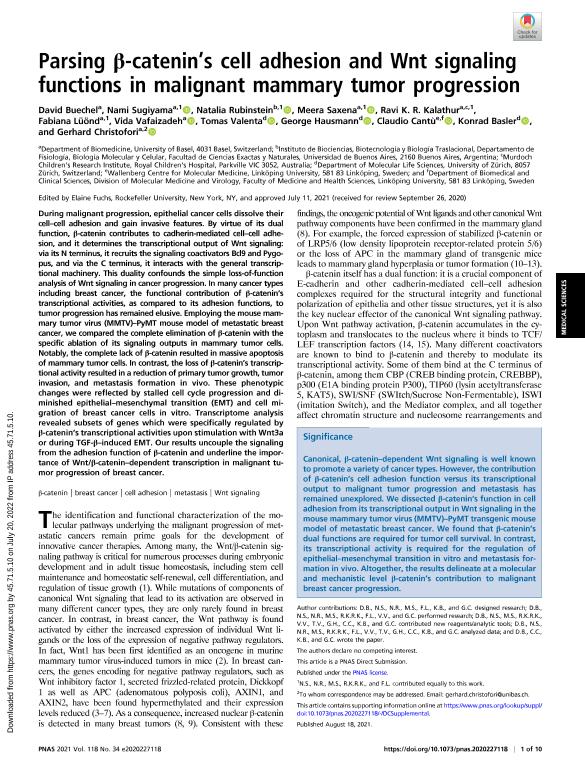Artículo
Parsing β-catenin’s cell adhesion and Wnt signaling functions in malignant mammary tumor progression
Buechel, David; Sugiyama, Nami; Rubinstein, Natalia ; Saxena, Meera; Kalathur, Ravi K.R.; Lüönd, Fabiana; Vafaizadeh, Vida; Valenta, Tomas; Hausmann, George; Cantù, Claudio; Basler, Konrad; Christofori, Gerhard
; Saxena, Meera; Kalathur, Ravi K.R.; Lüönd, Fabiana; Vafaizadeh, Vida; Valenta, Tomas; Hausmann, George; Cantù, Claudio; Basler, Konrad; Christofori, Gerhard
 ; Saxena, Meera; Kalathur, Ravi K.R.; Lüönd, Fabiana; Vafaizadeh, Vida; Valenta, Tomas; Hausmann, George; Cantù, Claudio; Basler, Konrad; Christofori, Gerhard
; Saxena, Meera; Kalathur, Ravi K.R.; Lüönd, Fabiana; Vafaizadeh, Vida; Valenta, Tomas; Hausmann, George; Cantù, Claudio; Basler, Konrad; Christofori, Gerhard
Fecha de publicación:
08/2021
Editorial:
National Academy of Sciences
Revista:
Proceedings of the National Academy of Sciences of The United States of America
ISSN:
0027-8424
e-ISSN:
1091-6490
Idioma:
Inglés
Tipo de recurso:
Artículo publicado
Clasificación temática:
Resumen
During malignant progression, epithelial cancer cells dissolve their cell–cell adhesion and gain invasive features. By virtue of its dual function, β-catenin contributes to cadherin-mediated cell–cell adhesion, and it determines the transcriptional output of Wnt signaling: via its N terminus, it recruits the signaling coactivators Bcl9 and Pygopus, and via the C terminus, it interacts with the general transcriptional machinery. This duality confounds the simple loss-of-function analysis of Wnt signaling in cancer progression. In many cancer types including breast cancer, the functional contribution of β-catenin’s transcriptional activities, as compared to its adhesion functions, to tumor progression has remained elusive. Employing the mouse mammary tumor virus (MMTV)–PyMT mouse model of metastatic breast cancer, we compared the complete elimination of β-catenin with the specific ablation of its signaling outputs in mammary tumor cells. Notably, the complete lack of β-catenin resulted in massive apoptosis of mammary tumor cells. In contrast, the loss of β-catenin’s transcriptional activity resulted in a reduction of primary tumor growth, tumor invasion, and metastasis formation in vivo. These phenotypic changes were reflected by stalled cell cycle progression and diminished epithelial–mesenchymal transition (EMT) and cell migration of breast cancer cells in vitro. Transcriptome analysis revealed subsets of genes which were specifically regulated by β-catenin’s transcriptional activities upon stimulation with Wnt3a or during TGF-β–induced EMT. Our results uncouple the signaling from the adhesion function of β-catenin and underline the importance of Wnt/β-catenin–dependent transcription in malignant tumor progression of breast cancer.
Palabras clave:
BREAST CANCER
,
CELL ADHESION
,
METASTASIS
,
WNT SIGNALING
,
Β-CATENIN
Archivos asociados
Licencia
Identificadores
Colecciones
Articulos(OCA CIUDAD UNIVERSITARIA)
Articulos de OFICINA DE COORDINACION ADMINISTRATIVA CIUDAD UNIVERSITARIA
Articulos de OFICINA DE COORDINACION ADMINISTRATIVA CIUDAD UNIVERSITARIA
Citación
Buechel, David; Sugiyama, Nami; Rubinstein, Natalia; Saxena, Meera; Kalathur, Ravi K.R.; et al.; Parsing β-catenin’s cell adhesion and Wnt signaling functions in malignant mammary tumor progression; National Academy of Sciences; Proceedings of the National Academy of Sciences of The United States of America; 118; 34; 8-2021; 1-10
Compartir
Altmétricas



